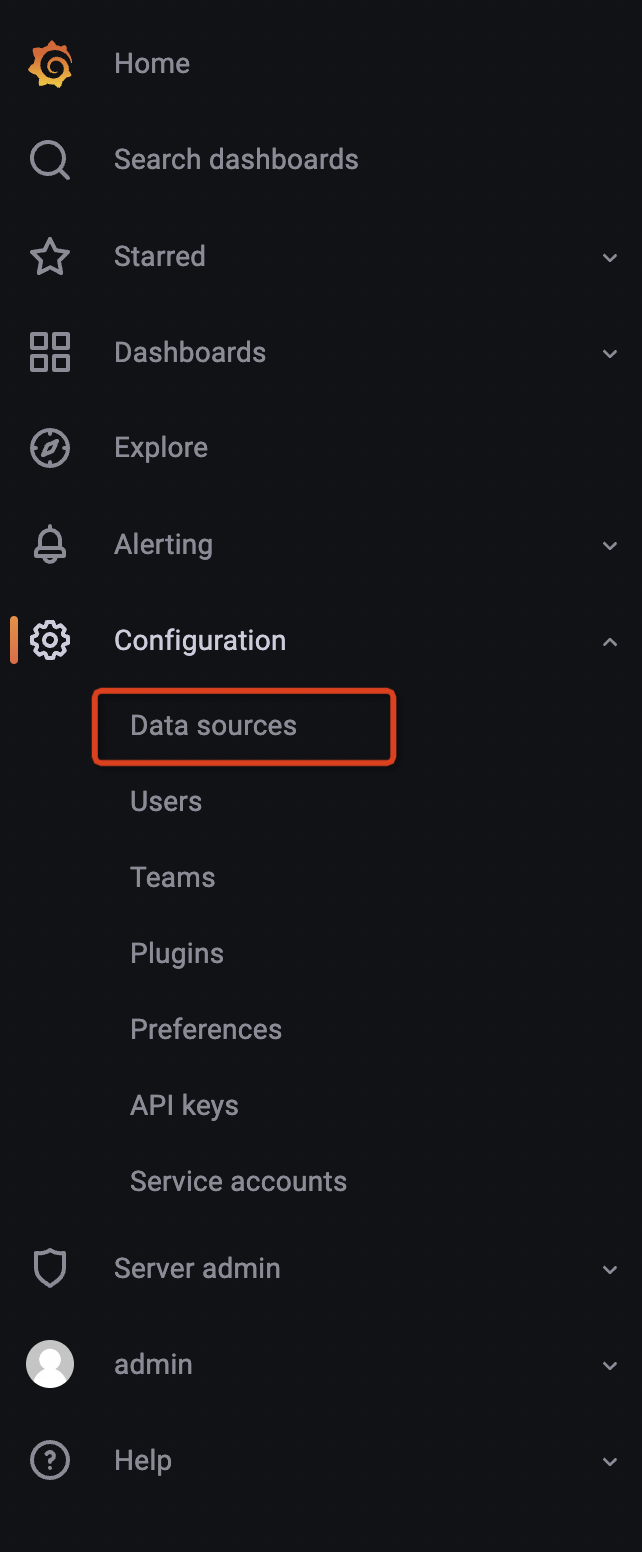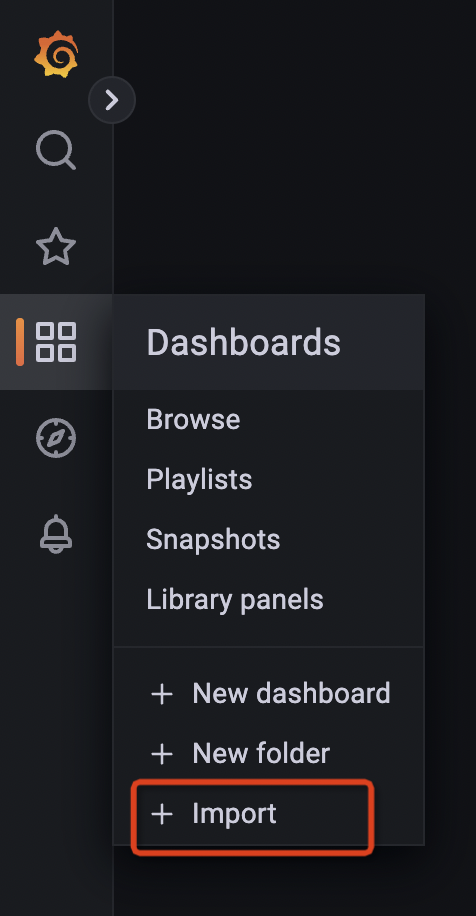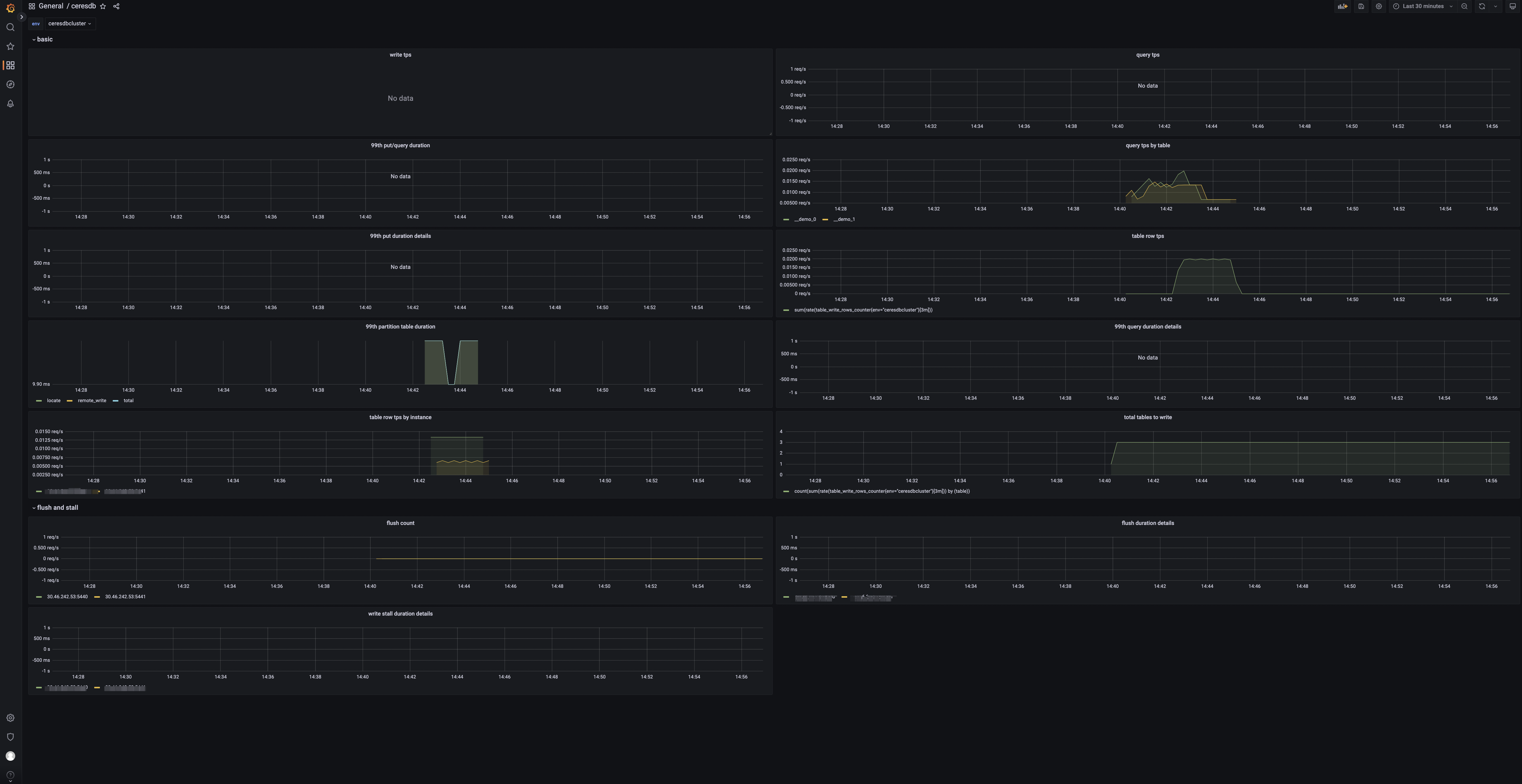This guide introduces the operation and maintenance of HoraeDB, including cluster installation, database&table operations, fault tolerance, disaster recovery, data import and export, etc.
This is the multi-page printable view of this section. Click here to print.
Operation and Maintenance
1 - Block List
Add block list
If you want to reject query for a table, you can add table name to ‘read_block_list’.
Example
| |
Response
| |
Set block list
You can use set operation to clear exist tables and set new tables to ‘read_block_list’ like following example.
Example
| |
Response
| |
Remove block list
You can remove tables from ‘read_block_list’ like following example.
Example
| |
Response
| |
2 - Cluster Operation
The Operations for HoraeDB cluster mode, it can only be used when HoraeMeta is deployed.
Operation Interface
You need to replace 127.0.0.1 with the actual project path.
- Query table When tableNames is not empty, use tableNames for query. When tableNames is empty, ids are used for query. When querying with ids, schemaName is useless.
curl --location 'http://127.0.0.1:8080/api/v1/table/query' \
--header 'Content-Type: application/json' \
-d '{
"clusterName":"defaultCluster",
"schemaName":"public",
"names":["demo1", "__demo1_0"],
}'
curl --location 'http://127.0.0.1:8080/api/v1/table/query' \
--header 'Content-Type: application/json' \
-d '{
"clusterName":"defaultCluster",
"ids":[0, 1]
}'
- Query the route of table
curl --location --request POST 'http://127.0.0.1:8080/api/v1/route' \
--header 'Content-Type: application/json' \
-d '{
"clusterName":"defaultCluster",
"schemaName":"public",
"table":["demo"]
}'
- Query the mapping of shard and node
curl --location --request POST 'http://127.0.0.1:8080/api/v1/getNodeShards' \
--header 'Content-Type: application/json' \
-d '{
"ClusterName":"defaultCluster"
}'
- Query the mapping of table and shard If ShardIDs in the request is empty, query with all shardIDs in the cluster.
curl --location --request POST 'http://127.0.0.1:8080/api/v1/getShardTables' \
--header 'Content-Type: application/json' \
-d '{
"clusterName":"defaultCluster",
"shardIDs": [1,2]
}'
- Drop table
curl --location --request POST 'http://127.0.0.1:8080/api/v1/dropTable' \
--header 'Content-Type: application/json' \
-d '{
"clusterName": "defaultCluster",
"schemaName": "public",
"table": "demo"
}'
- Transfer leader shard
curl --location --request POST 'http://127.0.0.1:8080/api/v1/transferLeader' \
--header 'Content-Type: application/json' \
-d '{
"clusterName":"defaultCluster",
"shardID": 1,
"oldLeaderNodeName": "127.0.0.1:8831",
"newLeaderNodeName": "127.0.0.1:18831"
}'
- Split shard
curl --location --request POST 'http://127.0.0.1:8080/api/v1/split' \
--header 'Content-Type: application/json' \
-d '{
"clusterName" : "defaultCluster",
"schemaName" :"public",
"nodeName" :"127.0.0.1:8831",
"shardID" : 0,
"splitTables":["demo"]
}'
- Create cluster
curl --location 'http://127.0.0.1:8080/api/v1/clusters' \
--header 'Content-Type: application/json' \
--data '{
"name":"testCluster",
"nodeCount":3,
"shardTotal":9,
"topologyType":"static"
}'
- Update cluster
curl --location --request PUT 'http://127.0.0.1:8080/api/v1/clusters/{NewClusterName}' \
--header 'Content-Type: application/json' \
--data '{
"nodeCount":28,
"shardTotal":128,
"topologyType":"dynamic"
}'
- List clusters
curl --location 'http://127.0.0.1:8080/api/v1/clusters'
- Update
enableSchedule
curl --location --request PUT 'http://127.0.0.1:8080/api/v1/clusters/{ClusterName}/enableSchedule' \
--header 'Content-Type: application/json' \
--data '{
"enable":true
}'
- Query
enableSchedule
curl --location 'http://127.0.0.1:8080/api/v1/clusters/{ClusterName}/enableSchedule'
- Update flow limiter
curl --location --request PUT 'http://127.0.0.1:8080/api/v1/flowLimiter' \
--header 'Content-Type: application/json' \
--data '{
"limit":1000,
"burst":10000,
"enable":true
}'
- Query information of flow limiter
curl --location 'http://127.0.0.1:8080/api/v1/flowLimiter'
- List nodes of HoraeMeta cluster
curl --location 'http://127.0.0.1:8080/api/v1/etcd/member'
- Move leader of HoraeMeta cluster
curl --location 'http://127.0.0.1:8080/api/v1/etcd/moveLeader' \
--header 'Content-Type: application/json' \
--data '{
"memberName":"meta1"
}'
- Add node of HoraeMeta cluster
curl --location --request PUT 'http://127.0.0.1:8080/api/v1/etcd/member' \
--header 'Content-Type: application/json' \
--data '{
"memberAddrs":["http://127.0.0.1:42380"]
}'
- Replace node of HoraeMeta cluster
curl --location 'http://127.0.0.1:8080/api/v1/etcd/member' \
--header 'Content-Type: application/json' \
--data '{
"oldMemberName":"meta0",
"newMemberAddr":["http://127.0.0.1:42380"]
}'
3 - Observability
HoraeDB is observable with Prometheus and Grafana.
Prometheus
Prometheus is a systems and service monitoring system.
Configuration
Save the following configuration into the prometheus.yml file. For example, in the tmp directory, /tmp/prometheus.yml.
Two HoraeDB http service are started on localhost:5440 and localhost:5441.
| |
See details about configuration here.
Run
You can use docker to start Prometheus. The docker image information is here.
docker run \
-d --name=prometheus \
-p 9090:9090 \
-v /tmp/prometheus.yml:/etc/prometheus/prometheus.yml \
prom/prometheus:v2.41.0
For more detailed installation methods, refer to here.
Grafana
Grafana is an open and composable observability and data visualization platform.
Run
You can use docker to start grafana. The docker image information is here.
docker run -d --name=grafana -p 3000:3000 grafana/grafana:9.3.6
Default admin user credentials are admin/admin.
Grafana is available on http://127.0.0.1:3000.
For more detailed installation methods, refer to here.
Configure data source
- Hover the cursor over the Configuration (gear) icon.
- Select Data Sources.
- Select the Prometheus data source.
Note: The url of Prometheus is http://your_ip:9090.

See more details here.
Import grafana dashboard

HoraeDB Metrics
After importing the dashboard, you will see the following page:

Panels
- tps: Number of cluster write requests.
- qps: Number of cluster query requests.
- 99th query/write duration: 99th quantile of write and query duration.
- table query: Query group by table.
- 99th write duration details by instance: 99th quantile of write duration group by instance.
- 99th query duration details by instance: 99th quantile of query duration group by instance.
- 99th write partition table duration: 99th quantile of write duration of partition table.
- table rows: The rows of data written.
- table rows by instance: The written rows by instance.
- total tables to write: Number of tables with data written.
- flush count: Number of HoraeDB flush.
- 99th flush duration details by instance: 99th quantile of flush duration group by instance.
- 99th write stall duration details by instance: 99th quantile of write stall duration group by instance.
4 - Table Operation
Query Table Information
Like Mysql’s information_schema.tables, HoraeDB provides system.public.tables to save tables information.
Columns:
- timestamp([TimeStamp])
- catalog([String])
- schema([String])
- table_name([String])
- table_id([Uint64])
- engine([String])
Example
Query table information via table_name like this:
| |
Response
| |
5 - Table Operation
HoraeDB supports standard SQL protocols and allows you to create tables and read/write data via http requests. More SQL
Create Table
Example
| |
Write Data
Example
| |
Read Data
Example
| |
Query Table Info
Example
| |
Drop Table
Example
| |
Route Table
Example
| |